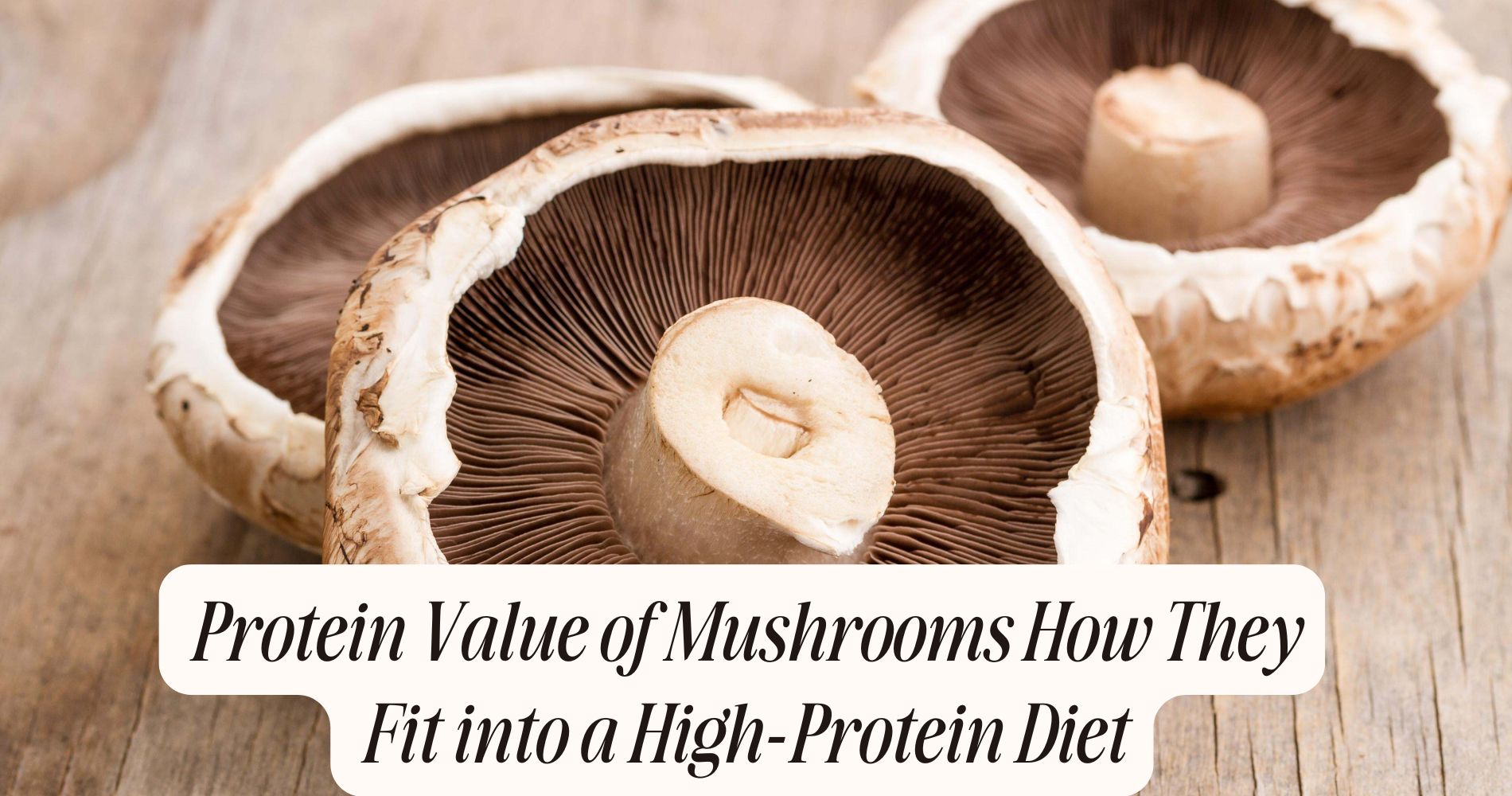
Protein Value of Mushrooms How They Fit into a High-Protein Diet
The protein value of mushrooms is often underestimated, yet these fungi offer a surprisingly beneficial plant-based protein source. Varieties like shiitake and portobello may not match meat gram for gram, but they provide essential amino acids and come packed with antioxidants, fiber, and other nutrients. Including mushrooms in your high-protein diet can diversify your nutrition while supporting overall health. Ready to rethink your plate? Let’s explore the full potential of mushrooms beyond their protein count.
Nutritional Profile of Mushrooms
When you consider the nutritional profile of mushrooms, you'll find they offer a unique combination of vitamins, minerals, and protein that can enhance your diet.
Various mushroom varieties, such as shiitake, portobello, and cremini, boast different nutritional benefits, making them versatile additions to your meals. For example, shiitake mushrooms are rich in B vitamins and selenium, essential for energy metabolism and immune function.

Portobellos provide potassium, which supports heart health, while cremini mushrooms offer antioxidants that combat oxidative stress.
Additionally, most mushrooms are low in calories, making them an excellent choice for weight management.
Protein Content in Different Mushroom Varieties
Mushrooms are surprisingly rich in protein compared to many other vegetables, making them a valuable addition to your diet. Different mushroom varieties vary in their protein content.
For instance, shiitake mushrooms provide about 2.2 grams of protein per 100 grams, while also offering shiitake benefits like antioxidants and immune support.
Portobello mushrooms, on the other hand, pack around 3.1 grams of protein per 100 grams, making them an excellent meat substitute in various dishes.
Both types contribute essential amino acids, which are vital for muscle repair and overall health. Incorporating these varieties into your meals not only enhances protein intake but also adds unique flavors and textures to your cooking.
Health Benefits of Incorporating Mushrooms
Incorporating mushrooms into your diet can greatly enhance your overall health due to their rich nutrient profile. Different mushroom types, such as shiitake, portobello, and maitake, offer unique health advantages.
For instance, shiitake mushrooms are packed with beta-glucans, which support immune function. Portobellos are rich in potassium, aiding in blood pressure regulation.

Additionally, mushrooms contain antioxidants like ergothioneine, which combat oxidative stress. You’ll also benefit from their fiber content, promoting digestive health.
Moreover, certain varieties, like lion's mane, may enhance cognitive function and reduce inflammation.
Creative Ways to Add Mushrooms to Your Meals
While many people enjoy mushrooms for their unique flavors, they can also be a versatile ingredient that enhances various dishes. You can easily incorporate mushrooms into your meals with a few creative mushroom recipes.
For example, sautéed mushrooms make excellent savory toppings for steaks, burgers, or grilled vegetables, adding depth and umami to your plate. Try blending mushrooms into sauces or soups for an earthy twist that elevates the dish.
You can also use finely chopped mushrooms as a filling in omelets or stuffed peppers, providing both texture and nutrition. By experimenting with different cooking methods, such as roasting or grilling, you'll discover new ways to enjoy mushrooms while boosting your protein intake.
Comparison of Mushrooms With Traditional Protein Sources
When considering protein sources, you might be surprised to learn that mushrooms offer a unique alternative to traditional options like meat, dairy, and legumes.
While mushrooms contain about 3 grams of protein per 100 grams, they excel in providing essential nutrients, antioxidants, and low-calorie content, making them a healthy addition to your diet.
In comparing mushrooms vs. meat, the latter typically offers higher protein density but with added saturated fats.

However, mushrooms shine as a versatile plant-based protein, perfect for those seeking to reduce meat consumption. They also enhance the umami flavor in dishes, making them a satisfying substitution.
Incorporating mushrooms into your meals can help balance your protein intake while diversifying your nutrient sources.
A Tasty Boost with SUPER MUSHROOM GUMMIES
If you're looking to tap into the full power of mushrooms without the hassle of cooking, SUPER MUSHROOM GUMMIES by Well Gummies offer a convenient, delicious solution. Packed with the goodness of 10 functional mushrooms—including Lion’s Mane, Reishi, Cordyceps, and more—these vegan, chewable gummies are designed to fuel your body and sharpen your mind. Whether you're focused on energy, immune support, or cognitive clarity, each wild berry-flavored gummy delivers calm, clean energy—no jitters, no crash. It’s the simplest way to experience the benefits of mushrooms every day.
Frequently Asked Questions
Are Mushrooms Suitable for Vegan and Vegetarian Diets?
Yes, mushrooms are great for vegan and vegetarian diets. They provide essential nutrients and contribute to balanced mushroom nutrition. While they’re not high in vegan protein, they complement other plant-based sources effectively.
Can Mushrooms Replace Meat in a High-Protein Diet?
Mushrooms can’t fully replace meat in a high-protein diet, but their mushroom protein offers a nutritious complement. As meat alternatives, they provide flavor, texture, and important nutrients, enhancing your meals without the full protein profile of meat.
How Do Cooking Methods Affect Mushroom Protein Content?
Cooking techniques like steaming or sautéing preserve mushroom protein retention better than boiling. Overcooking can lead to nutrient loss, so opt for quick methods to maintain their protein content and maximize their nutritional benefits.
Are There Any Allergies Associated With Eating Mushrooms?
You might experience mushroom allergies, though they’re rare. Allergic reactions can manifest as skin irritations or digestive issues. If you suspect an allergy, consult a healthcare professional for proper diagnosis and management. Stay informed!
Do Mushrooms Provide Complete Protein Like Animal Sources?
Mushrooms don't provide complete protein like animal sources; they lack some essential amino acids. However, their protein digestibility is decent, making them a valuable addition to your diet when combined with other protein sources for balance.
Conclusion
Incorporating mushrooms into your high-protein diet can enhance both flavor and nutrition. With varieties like shiitake and portobello providing valuable protein, they offer a unique plant-based alternative that complements traditional protein sources. Their low-calorie content and rich nutrient profile support overall health and muscle repair. By creatively adding mushrooms to your meals, you can enjoy their health benefits while diversifying your diet. Embrace mushrooms as a versatile and nutritious addition to your high-protein lifestyle.




